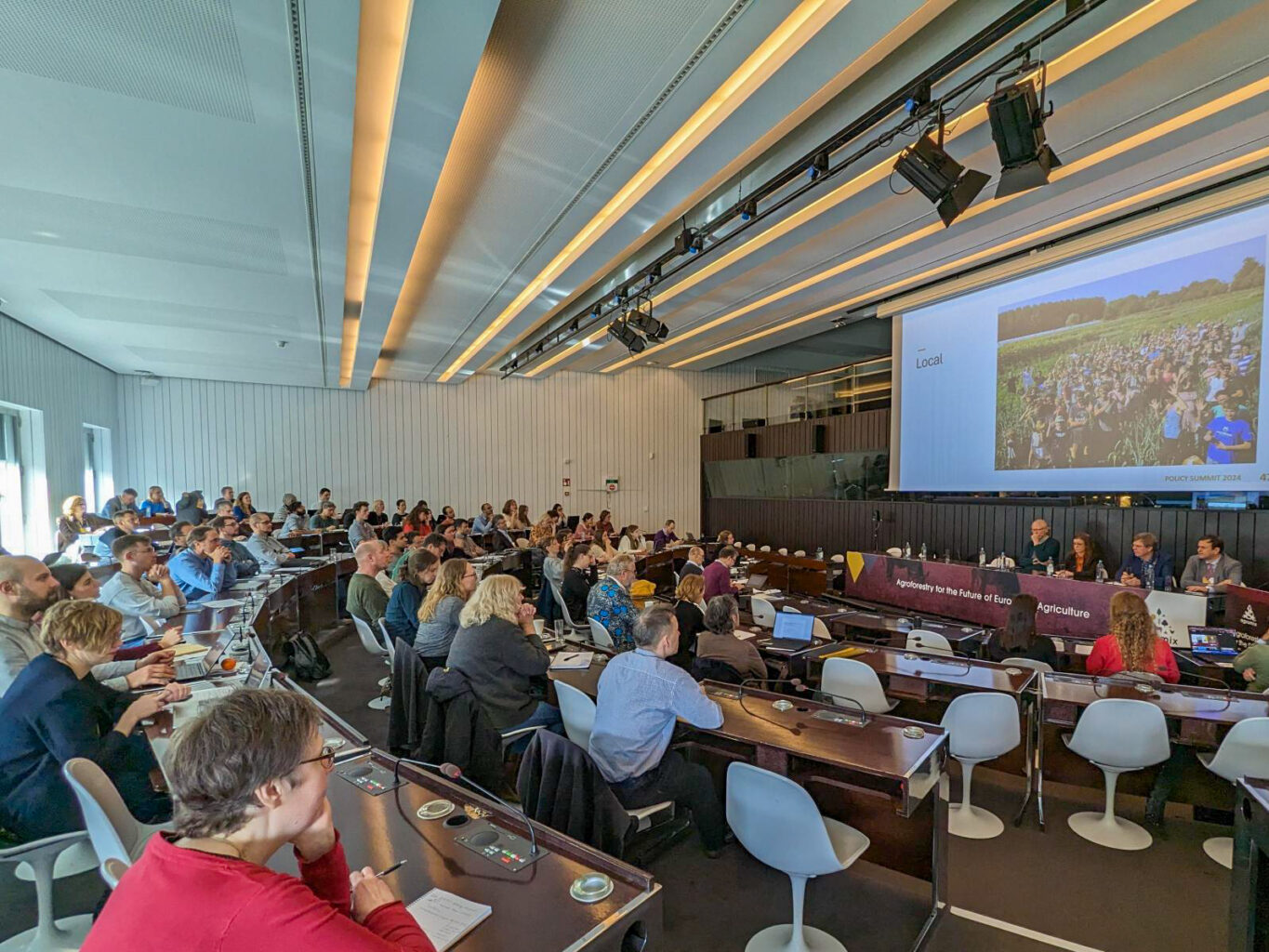Barcelona, 24 April 2024
The AGROMIX Policy Summit: Agroforestry for the Future of European Agriculture brought a wide array of voices, perspectives, and insights together in one room to explore ways in which agroforestry and mixed farming can be enhanced under EU policy.
Nearly 100 participants at the one-day Brussels summit on 17 April 2024 heard from the world of policy with the likes of Humberto Delgado Rosa, Director of ENVI.D - Biodiversity at DG ENVI, Tamas Szedlak, Forestry Expert at DG AGRI and Susana Gaona Sáez, who underlined the roles that agroforestry and mixed farming can play in the transition to more sustainable agriculture.
They also were brought up to date by farmers such as Elise Van Broeckhoven, Tijs Boelens and Morgan Ody, General Coordinator of La Via Campesina, who took to the stage to highlight the challenges they face when it comes to implementing agroecological systems in the present-day policy environment.
Many more important perspectives were offered at the event by storied researchers who shared their knowledge in dedicated presentations and contributed to the high-level debate session.
The summit was an occasion for AGROMIX partners to present their findings related to agroforestry and mixed farming policy within the project, more of which can be seen here in this dedicated section of the website. It also built momentum towards the publishing of a policy White Paper from the AGROMIX Project slated for September 2024.

Policy Debate Highlights
At the heart of the Summit was a cooperative exploration of agroforestry policy. This was molded by the findings of the AGROMIX Project and a coming together of perspectives at the summit itself. This culminated in a high-level debate that featured a broad spectrum of perspectives, ranging from farmers to policymakers and researchers to activists.
Delgado Rosa, a former Portuguese environment minister, pointed to the EU’s Green Deal and example of coherent policy-making although acknowledged some of its shortcomings.
“On coherence, I think the effort to get an answer to that was the Green Deal. The Green Deal was not only about trade-offs, signaling ‘now it’s only climate, we forget about the rest, climate is there with more ambition, the rest of the environment also together with the just transition for the social element and using the Green Deal as an economic strategy.”
He said this and initiatives like Farm to Fork and the biodiversity strategy aimed to connect the dots with on common goals but recognised that progress had been affected by political polarization and misunderstandings, as demonstrated with the Nature Restoration Law, for example, being painted as a “threat to food.”
He added: “It’s not either we have food or we have nature, it’s we have both or we have none.”
He pointed to agroforestry as a tool that can connect farming, the environment and biodiversity.

Anja Gassner, EU director at CIFOR-ICRAF, countered some of Delgado’s points, listing some international environmental goals that had been missed and saying: “It was nicely put, there’s the reason why we have the Green Deal, and you try to harmonise (...) within the European context, we now have a lot of criticism towards the Green Deal.”
She added: “Somehow, we haven’t got the buy-in from the people who actually need to put these policies in place. We had two farmers today, Elise and Tijs, both saying ‘it doesn’t work for us’ (...) how do we translate these polices back to the people who need to implement them?”
Ody, the general coordinator of La Via Campesina, said that none of the policies addressed a pressing issue: a lack of peasants.
“It should be the core of the policies; how do we ensure that there are more peasants making a decent living out of this essential work which is about providing food for the people and taking care of nature?”
Patrick Worms, Senior Science Policy Advisor at CIFOR-ICRAF continued: “We’ve made a bargain with the devil, which is that we get agricultural efficiency, produce agricultural surpluses, and cheap food, but the price is being paid by the peasants. The reason why there are no services in the countryside, the reason why there are no schools, shops, no hospitals is because agriculture has become so extraordinarily efficient.”

Alberto Mantino, Assistant Professor at Department of Agriculture, Food and Environment of the University of Pisa, asked the panel: “Why can’t a farmer become increasingly rich, year by year? We can help farmers to increase the benefits in this sense, to support the transition towards mixed farming and agroforestry, but we need to work with the idea that a farmer is a person like us. They want a salary, they want some holidays and, in this sense, we need to harmonise policy taking account of the needs of the farmer.
Szedlak, the Forestry Expert at DG AGRI, recalled the efforts being taken under the Rural Development policy, the so-called second pillar of the CAP, to improve life in rural areas.
“When we assessed these rural development programs, we examined not only the agriculture or forestry related information but the whole picture. From our point of view, this is very important, that we should see in a holistic way, the rural world.”
An AGROMIX Press Release
To mark the summit, the AGROMIX Project published a Press Release calling on the incoming European Commission to bring about an improved Green Deal. This publication urged the Commission to:
Read the full document here.
World Cafe Sessions
Ahead of the policy debate, summit participants broke off into smaller groups to discuss some of the pressing policy issues facing the wider adoption of agroforestry in the EU. A summary of those discussions can be found here.